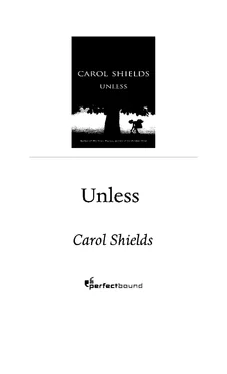Carol Shields - Unless
Здесь есть возможность читать онлайн «Carol Shields - Unless» — ознакомительный отрывок электронной книги совершенно бесплатно, а после прочтения отрывка купить полную версию. В некоторых случаях можно слушать аудио, скачать через торрент в формате fb2 и присутствует краткое содержание. Жанр: Современная проза, на английском языке. Описание произведения, (предисловие) а так же отзывы посетителей доступны на портале библиотеки ЛибКат.
- Название:Unless
- Автор:
- Жанр:
- Год:неизвестен
- ISBN:нет данных
- Рейтинг книги:4 / 5. Голосов: 1
-
Избранное:Добавить в избранное
- Отзывы:
-
Ваша оценка:
- 80
- 1
- 2
- 3
- 4
- 5
Unless: краткое содержание, описание и аннотация
Предлагаем к чтению аннотацию, описание, краткое содержание или предисловие (зависит от того, что написал сам автор книги «Unless»). Если вы не нашли необходимую информацию о книге — напишите в комментариях, мы постараемся отыскать её.
Unless — читать онлайн ознакомительный отрывок
Ниже представлен текст книги, разбитый по страницам. Система сохранения места последней прочитанной страницы, позволяет с удобством читать онлайн бесплатно книгу «Unless», без необходимости каждый раз заново искать на чём Вы остановились. Поставьте закладку, и сможете в любой момент перейти на страницу, на которой закончили чтение.
Интервал:
Закладка:
I didn’t know Tom as a child, and this has always seemed an incalculable loss. As an adult he is patient and preoccupied, a somewhat melancholy hedonist, also on occasion barbed, twitchy, and dishevelled; as a medical student in the seventies he was outrageous and was twice arrested for political demonstrations and, in partnership with his classmates, jailed for bandaging up the statues of esteemed Canadian heroes around Queen’s Park, putting splints on former prime ministers and blood-coloured paint on their muscular bronze chests. But what was he really like, that skinny kid running out into the yard after dinner with a football tucked under his arm, the screen door banging after him, the grass growing green and long-shadowed and in autumn dotted with wet yellow leaves? This imagined scene speaks of security and wood smoke and encrusted sunlight, and oh, I think, those swarming, uncaptured moments were stolen from me, snatched away by a mismatch of the primal timeline.
But it’s not just Tom; my own childhood is missing the same kind of specific content.
“The trouble with children,” Danielle Westerman once said, “is that they aren’t interested in childhood” (“Autoreflections,” private interview, 1977). Yes, and when they do finally develop sufficient curiosity, it’s too late. (She rejects entirely her childhood at La Roche-Vineuse, her father, her mother. Both of them neglected their only child, she confesses. But there must be more to it than that, I suspect, something sharper and more hurtful and sudden.) Most of what I remember from the early years is my own appalling ignorance. A partial view of the world was handed to me, a row of houses in the Kingsway area of Toronto, and the rest I had to pretend to know. Like all children, I was obliged to stagger from one faulty recognition to the next, always about to stumble into shame. It isn’t what we know but what we don’t know that does us in. Blushing and flushing, shuffling and stuttering — these are surface expressions of a deeper pain. The shame of ignorance is killing. “I nearly died,” grown-ups say of their early dumb misunderstandings, and they mean that the revealing of their ignorance feels like a stoppage of the heart.
At least this is how I, Reta Winters (née Summers), felt as a child, rummaging through an even younger child’s mind and seeing nothing but a swirl of images before words and grammar arrived, a sort of fingerpainting, wet and vivid smears of colour that signalled, mostly, danger. I recognized from the beginning that I was unhinged from what I assumed everyone else in the world knew. I was obliged to regulate the world, but in secret. Why was the sky blue if you looked up but not when you looked at it sideways? What if the moon fell down into our garden or, worse, onto the roof? These questions, more like miracles in their phenomenological shapes, gathered around me and formed the oxygen I breathed, and what they whispered to me was: You will very possibly be killed because of your ignorance. It could happen at any moment.
Someone entered our garden, when I was a child, and carried away every blossom from my mother’s three hydrangea bushes. My mother took this assault with remarkable good humour, as though she didn’t know the real danger we were in. I knew, though. I knew our family had been chosen and that the missing flowers signified a greater evil and a part of a larger design, which might ultimately lead to death, but I was unable to turn my fears into words, since I knew at a completely other level that I was being ridiculous.
Such gaps of comprehension, such incompletions, had to be lived with silently — that seemed the natural law. A child is suspended in a locked closet of unknowing, within the body’s borders, that dark place. To name a perplexity is to magnify it. At the same time — I recognized the calumny for what it is — children’s natural observations are often thought to be whimsical, even adorable, and their sayings, their mild queries, much quoted and smiled over, but there is no guarantee of an answer. Why do children risk disclosure at all? It must be out of desperation or unsupportable fear. It’s a wonder they don’t throw themselves out of windows in fits of confusion.
Our sunny daughter Norah teased us with curious notions. Voices talking in her head, she said. All the time. But we understood at once that this meant nothing, only that she had become conscious of the lifelong dialogue that goes on in a person’s head, the longest conversation any of us has. Oh hello, it’s me again. And again. The most interesting conversation we’ll ever know, and the most circular and repetitive and insane. Please, not that woman again! Doesn’t she ever shut up? (This is why I read novels: so I can escape my own unrelenting monologue.)
I suspect that little Reta Summers was slower than most in accepting the unknotting of earthly matter and manifestation, or else she was more afraid of ridicule. I tried to puzzle things out for myself. There was a war, for instance, and everyone talked about it, how awful it was with people getting killed, even babies, who were horribly burned. But what was a war exactly? What was napalm? How far away was Vietnam? No one told me, but I figured out it must be in the lane behind the Bloor Street delicatessen because I’d once heard loud noises coming from the store’s back wall. I cried when I was taken to this place, even though my mother and father were holding my hand. They didn’t ask me why I was crying. Probably they thought I was scared of Mr. Hopkins, who had a moustache and cut meat with a black blade as long as his arm.
I understood that people had two names or sometimes three. I was really Reta Ruth Summers. Before I went to school I’d learned to recite my address, 555 Strath Avenue, and my telephone number, and everyone thought this was amazing for a child of my age. Once in a while I was allowed to hold the phone up to my ear and talk to Grandma or Aunt Judy. “But Aunt Judy isn’t a real aunt,” my mother told me carefully. I knew what real meant. You could touch it or see it, it wasn’t made up like the stories I invented.
The angels are moving their furniture, they said when the thunder roared on a summer night; Le tonnerre, my mother whispered dramatically, making her eyes big and letting me know this was a splendid thing, nothing to be frightened of. But the angel part was nonsense.
Even they knew it was nonsense, the way their lips came together as they said the words, confessing that they loved their own piece of whimsy dearly, but I must have loved it too when I think of the way I swallowed down its easy comfort.
My mother always spoke to me in French and my father in English, and I was allowed to reply in either language. This was part of a pact the two of them had made before my birth, that any child of theirs would grow up in two languages, and that they would share responsibility for this plan. My mother, a pure laine Marteau from Montreal, spoke a musical French, and my father a crisp Edinburghian English, only slightly eroded by his years in Canada.
Oddly, the epic confusion of my early years was not caused but rather mitigated by immersion in two languages; doubleness clarified the world; la chaise, chair; le rideau, curtain; être, to be; le chien, dog. Every object, every action, had an echo, an explanation.
Meaning had two feet, two dependable etymological stems. I swam in English, a relaxed backstroke, but stood up to my hips in French. The French-English dictionary with its thready blue cover was our family bible, since we were a family unattached to formal religious practice.
Nevertheless, they taught me to say a prayer at bedtime. “Dear Jesus, bless Mummy and Daddy and Grandma and the two grandpas and Aunt Judy and make me a good girl.” What I knew of Jesus I plucked from the air. Jesus was invisible, but he could hear everything I thought or said. He could see me even when I sat on the toilet, which was humiliating. He was like God but not as old as God. He didn’t stop loving me when I was bad, not that I believed this for a moment. He wore a brown gown and liked to have kids climbing on his lap. He wasn’t invisible then. Nails were driven through his hands and feet; I couldn’t bear to think of that, the tearing of flesh.
Читать дальшеИнтервал:
Закладка:
Похожие книги на «Unless»
Представляем Вашему вниманию похожие книги на «Unless» списком для выбора. Мы отобрали схожую по названию и смыслу литературу в надежде предоставить читателям больше вариантов отыскать новые, интересные, ещё непрочитанные произведения.
Обсуждение, отзывы о книге «Unless» и просто собственные мнения читателей. Оставьте ваши комментарии, напишите, что Вы думаете о произведении, его смысле или главных героях. Укажите что конкретно понравилось, а что нет, и почему Вы так считаете.












